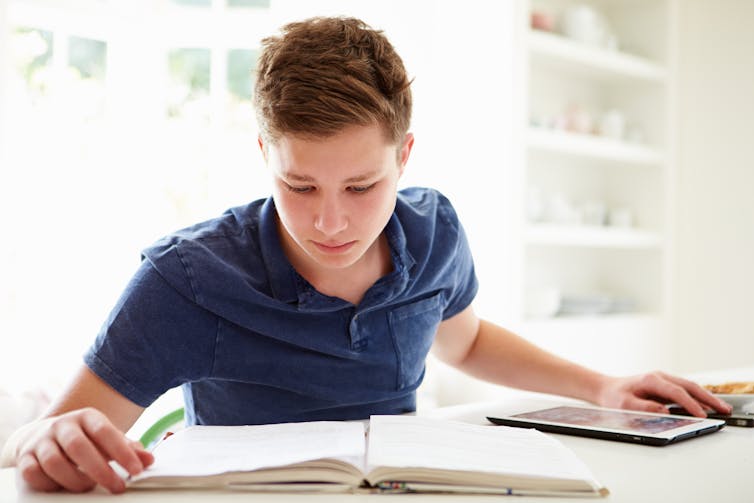Curious Kids: how can we concentrate on study without getting distracted?
- Written by John Munro, Professor, Faculty of Education and Arts, Australian Catholic University
How can we concentrate on a particular thing (like studies) without getting distracted? Melvina, aged 14
Thanks for this great question, Melvina!
Many students are probably wondering the same thing as end-of-year assessments approach.
To concentrate best we need to resist distractions. To do this, it helps if you know what concentration looks like.
What is concentration?
When you concentrate, you direct or focus your thinking. Imagine your focus is like a torch beam.
This torch beam needs energy, which comes from your concentration. So we can think of concentration as the “mental energy” or “thinking petrol” your brain needs to focus.
Read more: Curious Kids: Is homework worthwhile?
We know it’s important to concentrate to get the best results from a project or task. But, with distractions everywhere, we also know how hard it can be.
So what distractions should we look out for?
Deal with physical distractions
These are distractions in your environment. It’s a good idea to take steps to reduce them.
First, try to adjust the amount of light and noise to a level that works best for you.
This might mean getting rid of excessive background noise, or quietening it to a level that helps you concentrate. The level that works best for you depends on your personality, the type of noise and how demanding the task you’re concentrating on is.
When it comes to lighting, for most people, brighter white lighting helps concentration. But, as with background sound, there’s no single rule that works for everyone.
Read more: Curious Kids: is it OK to listen to music while studying?
It can also help to keep your study space tidy and remove any items that could distract you, like your mobile phone.
 Being in a noisy environment can make it tricky to concentrate, so try to study somewhere quiet.
Shutterstock
Being in a noisy environment can make it tricky to concentrate, so try to study somewhere quiet.
Shutterstock
Thoughts and feelings can be pretty distracting too
If you find yourself thinking of things you’d rather be doing than the task at hand, take a moment to consider what you’ll do after you’ve completed the task, and how much more you’ll enjoy them because of what you’ve achieved.
Read more: Curious Kids: Why does English have so many different spelling rules?
Feelings can be pretty distracting too.
If you feel worried about how people will respond to what you produce, like an essay or presentation, you might be hesitant to get started. To manage this, try noting how a task or topic fits with what you already know, or remind yourself of a time you got through a similar task.
There are a few things you can do before, during and after a task to help too.
How to manage distractions
When you start a study session, it’s useful to:
decide what you want to get from the activity. What will the outcome look like?
set yourself up so you can see your computer screen or books without straining your body
remember what you already know about the topic or the task
plan the steps you could take to complete the task.
 You’ll probably become distracted at some point during your study. That’s OK! Try your best to get back on track and recap what you’ve learnt toward the end of a task.
Shutterstock
You’ll probably become distracted at some point during your study. That’s OK! Try your best to get back on track and recap what you’ve learnt toward the end of a task.
Shutterstock
As you work through the topic or the task, it’s helpful check your progress. Note what you’ve achieved so far. Are you moving towards your goal or do you need to change direction?
This helps you deal with distractions while you’re learning.
How to beat distractions
Towards the end of a task, review what you’ve learnt and store it in memory. This allows you to get around distractions that occurred during the learning.
Give this a go:
say what you know now that you didn’t know earlier
say how your new understanding has changed or added to what you knew
feel positive about what you know now. Congratulate yourself on what your brain has done. The positive feeling helps you remember it better in the future
imagine yourself remembering and using the main ideas in the future.
When you store your new understanding like this, you can use it more easily in the future to concentrate and to get around distractions.
Hello, curious kids! Have you got a question you’d like an expert to answer? Ask an adult to send your question to curiouskids@theconversation.edu.au
Authors: John Munro, Professor, Faculty of Education and Arts, Australian Catholic University






